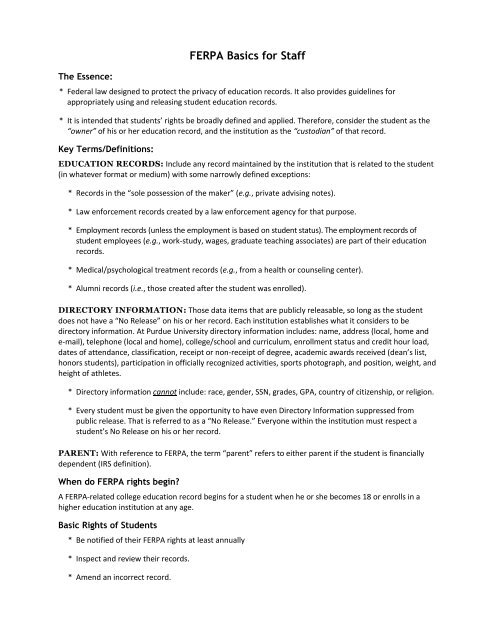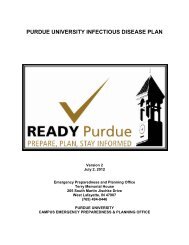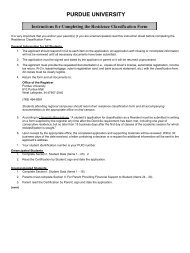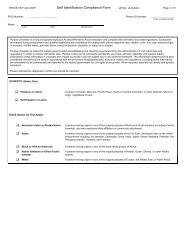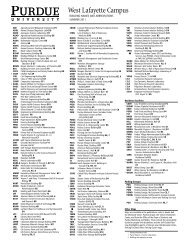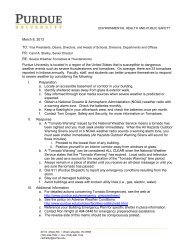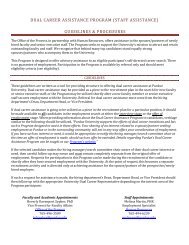FERPA Basics for Staff Handout - Purdue University
FERPA Basics for Staff Handout - Purdue University
FERPA Basics for Staff Handout - Purdue University
Create successful ePaper yourself
Turn your PDF publications into a flip-book with our unique Google optimized e-Paper software.
The Essence:<br />
<strong>FERPA</strong> <strong>Basics</strong> <strong>for</strong> <strong>Staff</strong><br />
* Federal law designed to protect the privacy of education records. It also provides guidelines <strong>for</strong><br />
appropriately using and releasing student education records.<br />
* It is intended that students’ rights be broadly defined and applied. There<strong>for</strong>e, consider the student as the<br />
“owner” of his or her education record, and the institution as the “custodian” of that record.<br />
Key Terms/Definitions:<br />
EDUCATION RECORDS: Include any record maintained by the institution that is related to the student<br />
(in whatever <strong>for</strong>mat or medium) with some narrowly defined exceptions:<br />
* Records in the “sole possession of the maker” (e.g., private advising notes).<br />
* Law en<strong>for</strong>cement records created by a law en<strong>for</strong>cement agency <strong>for</strong> that purpose.<br />
* Employment records (unless the employment is based on student status). The employment records of<br />
student employees (e.g., work-study, wages, graduate teaching associates) are part of their education<br />
records.<br />
* Medical/psychological treatment records (e.g., from a health or counseling center).<br />
* Alumni records (i.e., those created after the student was enrolled).<br />
DIRECTORY INFORMATION: Those data items that are publicly releasable, so long as the student<br />
does not have a “No Release” on his or her record. Each institution establishes what it considers to be<br />
directory in<strong>for</strong>mation. At <strong>Purdue</strong> <strong>University</strong> directory in<strong>for</strong>mation includes: name, address (local, home and<br />
e-mail), telephone (local and home), college/school and curriculum, enrollment status and credit hour load,<br />
dates of attendance, classification, receipt or non-receipt of degree, academic awards received (dean’s list,<br />
honors students), participation in officially recognized activities, sports photograph, and position, weight, and<br />
height of athletes.<br />
* Directory in<strong>for</strong>mation cannot include: race, gender, SSN, grades, GPA, country of citizenship, or religion.<br />
* Every student must be given the opportunity to have even Directory In<strong>for</strong>mation suppressed from<br />
public release. That is referred to as a “No Release.” Everyone within the institution must respect a<br />
student’s No Release on his or her record.<br />
PARENT: With reference to <strong>FERPA</strong>, the term “parent” refers to either parent if the student is financially<br />
dependent (IRS definition).<br />
When do <strong>FERPA</strong> rights begin?<br />
A <strong>FERPA</strong>-related college education record begins <strong>for</strong> a student when he or she becomes 18 or enrolls in a<br />
higher education institution at any age.<br />
Basic Rights of Students<br />
* Be notified of their <strong>FERPA</strong> rights at least annually<br />
* Inspect and review their records.<br />
* Amend an incorrect record.
* Consent to disclosure (with exceptions).<br />
Annual Notification<br />
Every institution must notify students of their basic <strong>FERPA</strong> rights at least annually.<br />
* The means by which that notice occurs is not specified.<br />
* <strong>Purdue</strong>’s annual notice can be found on the Student Consumer In<strong>for</strong>mation web site<br />
www.purdue.edu/consumer/<br />
Inspection and Review<br />
<strong>FERPA</strong> <strong>Basics</strong> <strong>for</strong> <strong>Staff</strong> (cont’d)<br />
Students have the right to see everything in their “education record,” except:<br />
* In<strong>for</strong>mation about other students,<br />
* Financial records of parents,<br />
* Confidential letters of recommendation if they waived their right of access (which cannot be required).<br />
There is no records retention policy under <strong>FERPA</strong>. It does not state what records you must make or how long<br />
you must keep them. Those are institutional decisions. You cannot destroy records once requested.<br />
Right to Consent to Disclosure<br />
Start with the premise that the student has the right to control to whom his or her education record is<br />
released. Then, there are several exceptions when that permission is not required. Historically, we had to<br />
have a signed release. Regulations now provide more flexibility <strong>for</strong> utilizing electronic signatures.<br />
WHEN IS PRIOR CONSENT NOT REQUIRED?<br />
The institution may release records without consent, but is not required to do so. Some examples of the<br />
exceptions <strong>for</strong> having a release include:<br />
* “School officials” with a “legitimate educational interest”/“need to know;” Employees and legal agents<br />
have access to education records in order to per<strong>for</strong>m their official, educationally-related duties.<br />
* Disclosure to another institution where student seeks to enroll or is enrolled;<br />
* Disclosure to ED, state/local education authorities;<br />
* Disclosure in connection with the receipt of financial aid (validating eligibility); includes veteran’s<br />
benefits;<br />
* Disclosure to state/local officials in conjunction with legislative requirements;<br />
* Disclosure to organizations conducting studies to improve instruction, or to accrediting organizations;<br />
* Disclosure to parents of dependent students (IRS definition);<br />
* To comply with a judicial order or lawfully issued subpoena;<br />
* Disclosure <strong>for</strong> a health/safety emergency; and<br />
* Disclosure of directory in<strong>for</strong>mation.
* Disciplinary in<strong>for</strong>mation (Warner Amendment):<br />
• Disclosure to the alleged victim, in<strong>for</strong>mation from disciplinary proceedings;<br />
• Only when found in violation, and only <strong>for</strong> crimes of violence--release of name, sanction and outcome<br />
(public in<strong>for</strong>mation); and<br />
* Disclosure to parents of any student under the age of 21, a violation of federal, state, local or<br />
institutional laws/regulations related to substance abuse (Foley Amendment).<br />
<strong>FERPA</strong> rights (and the right to privacy) end at death, unless otherwise specified by state law.<br />
Students have a <strong>for</strong>mal right to file a complaint with the Department of Education.<br />
Key Resources <strong>for</strong> Additional In<strong>for</strong>mation:<br />
* Office of the Registrar<br />
http://www.purdue.edu/registrar/<strong>FERPA</strong>/<strong>FERPA</strong>_.html<br />
ferpa@purdue.edu<br />
765-494-8219<br />
* <strong>FERPA</strong> Certification http://www.purdue.edu/registrar/<strong>FERPA</strong>/<strong>FERPA</strong>_.html; Student Systems and<br />
HIPAA Training<br />
* AACRAO (Federal Relations) www.aacrao.org<br />
* Family Compliance Office of the Department of Education (administers <strong>FERPA</strong> compliance)<br />
www.ed.gov/policy/gen/guid/fpco/index.html<br />
AACRAO 2010 <strong>FERPA</strong> Guide


